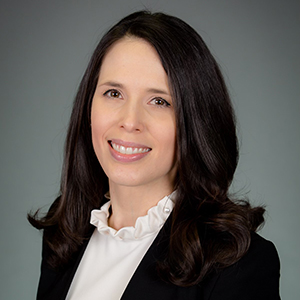 The industry event anyone in secured finance attends now celebrates its 77th year. SFNet is set to make the Arizona convention a memorable one. Click below to register.
The industry event anyone in secured finance attends now celebrates its 77th year. SFNet is set to make the Arizona convention a memorable one. Click below to register.

Pauline McTernan
Partner, Otterbourg P.C.
Pauline is a partner in Otterbourg P.C.’s litigation group and is co-chair of the recruiting committee. As part of her wide-ranging litigation practice, Pauline has extensive experience in dealing with the back end of commercial finance transactions: those unfortunate situations that end up in litigation, workout or bankruptcy. Among other matters, Pauline is currently defending a secured lender in post-payoff lender liability litigation and representing a secured lender in a contested cash collateral matter involving fraud by the borrower. Previously, she has also represented secured lenders in the bankruptcy of a metals company, in litigation against the purchaser of a borrower’s assets, and in litigation relating to an Article 9 sale.
Pauline was recently promoted to partner following her return from maternity leave after the birth of her second child in March 2021. While managing her family responsibilities, Pauline is leading Otterbourg’s representations of several critical suits on behalf of lenders in various state, federal, and bankruptcy courts and spearheading Otterbourg’s efforts to recruit the firm’s next generation of bright and diverse attorneys. Pauline received her J.D., cum laude, from the New York University School of Law in 2008, and a B.A. with Distinction from the University of Wisconsin-Madison.
What is the best professional advice you have been given and how have you implemented it?
Your reputation precedes you, and will follow you. (And relatedly, never send an email angry!) You may be working on that one case with that frustrating counterparty now, but chances are your paths will cross again under different circumstances. You want to be remembered for your integrity and competence, and not any negative attribute such as combativeness, sloppiness, or, worst case, untrustworthiness. A mentor of mine once received a call from a lawyer on the opposing side of a matter when he was leaving his law firm for another firm. He called to provide notice of his departure and to say that he always admired my mentor’s integrity, even if they did not see eye to eye. That is something to aspire to.
What advice do you normally give to the junior talent you mentor?
Take ownership of what you are working on and never be afraid to ask questions. As to the first, it is important to invest yourself in your work. You should have a sense that you are putting your best foot forward in whatever you do. Take initiative. As to the second, as lawyers we are trained to be critical thinkers, but sometimes that goes out the door when taking direction from our superiors. But people are only human. They make mistakes, they think they know something based on how it used to be done, etc. Do not be afraid to question, play devil’s advocate, or to suggest a potential solution that is “outside the box.”
What advice would you give on how to self-advocate?
For many of us, self-advocacy falls under the category of easier said than done. It is all too easy to rationalize why you are not getting promoted or getting that raise, for example. However, in doing so, you are selling yourself short. You have nothing to lose and everything to gain by putting yourself out there. Chances are that if you believe your contribution is valuable, others do too. In many ways, self-advocating is similar to oral argument. Be prepared to provide a concise statement of what you are asking for, along with tangible examples of your attributes and achievements meriting that result.
With many working remotely or hybrid-style the past few years, what are some work-life balance strategies you’ve stuck with?
It is a weird world we are living in post-March 2020, that’s for sure! There is no denying that the world is irretrievably different. Those of us who have had the option to work remotely over the past two years have been both blessed and cursed with remote work. On the one hand, remote work offers flexibility. On the other hand, without commutes and “office hours,” there is no longer any clear delineation between personal time and work. Given these competing factors, the work-life balance strategy that has worked best for me so far is splitting my time working from the office and from home, and I am grateful that Otterbourg P.C., my clients, and my family have all been supportive of me in that regard. In addition, self-care cannot be understated. There is a reason why they tell you to put on your oxygen mask first on an airplane—only when you care for yourself can you be the person you need to be for others.
77th Annual Convention
 The industry event anyone in secured finance attends now celebrates its 77th year. SFNet is set to make the Arizona convention a memorable one. Click below to register.
The industry event anyone in secured finance attends now celebrates its 77th year. SFNet is set to make the Arizona convention a memorable one. Click below to register.
